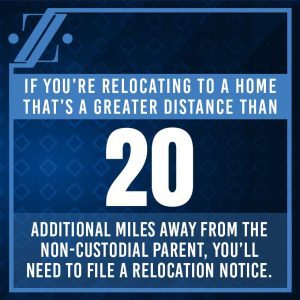
Moving is a major life decision that’s even more stressful and complicated when you have children with a co-parent. If you are a custodial parent, you may need to file a notice in court in order to move.
This notice will inform the family court of your intention to move, and it will allow the non-custodial parent to object to your relocation.
In this blog, you’ll learn what you need to know about child custody relocation. We’ll discuss when you’re required to file a notice, what you’ll need when filing, and how to navigate a custody relocation hearing.
Have additional questions about child custody relocation notices? Contact the Indiana family law attorneys at Zentz Law by calling 317-220-6056.
Do I Need to File a Relocation Notice?


Additionally, you don’t need to file a relocation notice if your new home is no more than 20 miles further away from the non-custodial parent, so long as the move does not change the child’s school. For instance, if your current home is 30 miles away from the non-custodial parents, you will not need to file a notice if your new home is 49 miles away from the other parent.
If you’re relocating to a home that’s a greater distance than 20 additional miles away from the non-custodial parent, you’ll need to file a relocation notice. You’ll need to file this notice at least 30 days before you move, and you must also notify the other parent.
What Do I Need to File a Relocation Notice?
When you file your notice of intent to relocate, you’ll need to provide the court with details regarding your new location. You’ll also need to file statements about your existing custody agreement.
Specifically, your relocation notice must include:
- The date you intend to move
- Your new physical address and mailing address
- Your new home phone number and any other phone number you may have
- A statement explaining why you’re moving
- A statement expressing whether or not you think you’ll need to revise the parenting plan and visitation
- A statement saying that the non-relocating parent has 20 days to file an objection
- A statement that the parent who isn’t relocating can file a petition in an attempt to change custody, visitation, and parenting time
- A statement expressing that previously established court orders will remain until the court modifies them
Why Might a Parent Object to My Relocating?
After notifying the parent who isn’t moving, they’ll have 20 days to file an objection. If the parent doesn’t file an objection within this time, the court will approve your notice.
If the parent does file an objection, you may need to undergo a custody hearing.
Some of the reasons why a non-custodial parent may object to a move include:
- The move will lead to the parent having less time with their child
- Their child is over 14 and doesn’t want to relocate
- The move isn’t in the best interest of their child
- The move will hurt their relationship with their child
Relocation Custody Hearings
If the non-moving parent objects to your relocation, you may need to go through a custody hearing. This hearing won’t necessarily alter existing custody or

The first part of this hearing will involve the reason for the move in the first place. You’ll need to provide evidence showing that you are relocating for a legitimate reason rather than an arbitrary choice.
Some of the reasons that the court will most likely consider valid include:
- Getting a new job
- Relocating to be closer to family
- Moving to be closer to your current job
- Moving in with a spouse
If you’re able to prove that you’re moving for a legitimate reason, the objecting parent will need to prove their own claim. They’ll need to show that it’s better for your child if you don’t move.
The court will then decide whether or not you’re legally allowed to relocate with your child. Of course, the court can’t prevent you from moving, but they may prohibit you from moving with your child if it violates other court decisions, such as child support and shared custody. The court may also forbid you from relocating your child if the objecting spouse can prove that the child should stay.
Need Help Filing a Relocation Notice? Contact an Indiana Family Law Attorney
As a custodial parent, relocating a child can be a complex process, especially if the other parent files an objection. If you have questions regarding this process or need legal representation, don’t hesitate to get in touch with the family law attorneys at Zentz Law.
You can book an appointment with us today online or by calling 317-220-6056.
***Please note: This page is not intended to give specific legal advice but is meant for information purposes only. Contact us to discuss your case***

